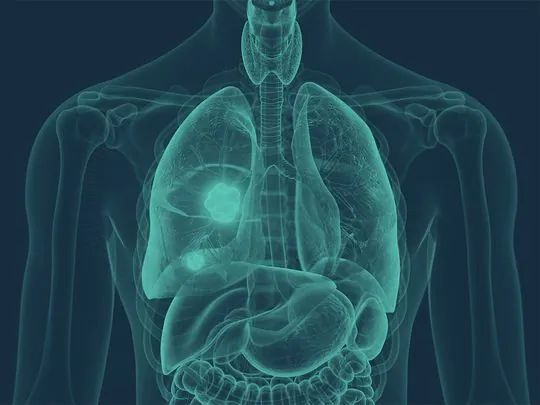
Urgent Action Needed as Lung Cancer Fatality Rate Hits 90% in the Middle East and Africa
2024-12-09
Author: Li
Introduction
As global agreements aimed at combating climate change and improving air quality inch along, the situation in the Middle East and Africa (MEA) has reached a critical point. An alarming statistic reveals that 90% of individuals diagnosed with lung cancer in the region do not survive. This pressing issue demands immediate action, focusing on investment in prevention and early detection strategies.
Current Outlook in the MEA
Professor Humaid O. Al Shamsi, a leading figure in oncological circles and member of the Lung Ambition Alliance, warns that the existing outlook for lung cancer patients in the MEA is grim. Too often, early symptoms of lung cancer, such as chronic cough and breathlessness, are dismissed as minor ailments, leading to diagnoses occurring only when the disease is advanced and survival rates plummet.
The Role of Technology
Advancements in medical technology have provided vital tools in the fight against this deadly disease. Low-dose CT (LDCT) scans have proven highly effective in early detection, with a National Lung Screening Trial indicating a 20% decrease in lung cancer mortality for those who underwent screening. Moreover, emerging technologies, including artificial intelligence in medical imaging, are revolutionizing how at-risk patients are identified and treated, facilitating quicker responses from healthcare providers.
Barriers to Accessing Screenings
However, many patients in the MEA continue to face barriers to accessing these crucial screenings. While early detection and intervention may appear cost-prohibitive on the surface, the long-term economic consequences of untreated, late-stage lung cancer—including lost workforce productivity and increased healthcare costs—far outweigh the initial investments.
Economic Implications
Estimates suggest soaring economic ramifications, particularly in countries like Saudi Arabia, where lung cancer costs could balloon to $2.49 billion by 2030, driven mainly by healthcare management expenses and diminished economic productivity. Thus, prioritizing early detection not only saves lives but is essential for securing the region's economic sustainability.
Cultural Shifts Needed
Yet, tackling lung cancer also necessitates a cultural shift. Deep-seated social norms, especially regarding smoking habits, perpetuate high lung cancer incidence rates. Activities such as shisha and hookah smoking present notable risks, compounding the urgency for awareness campaigns aimed at reshaping societal attitudes toward tobacco use and lung cancer screenings. Community leaders can play an instrumental role in this transformation by debunking myths and encouraging proactive health measures.
Promising Developments
There are, however, promising developments in the region. In 2017, the Department of Health in Abu Dhabi launched a dedicated lung screening service for individuals aged 55 to 75, utilizing low-dose CT scans to catch lung cancer early. Furthermore, recent policy adjustments in the UAE reflect a commitment to enhancing early detection measures as part of a broader national healthcare strategy.
Progress in Other Countries
Kenya is also making strides, integrating AI technology to bolster early detection capabilities for lung diseases, including TB and lung cancer, thereby improving outcomes in resource-constrained environments. Meanwhile, Egypt's 100 Million Healthy Lives campaign is targeting early detection of cancer through community outreach, aiming to screen up to one million people for lung cancer alone.
Conclusion and Call to Action
Despite these advancements, the importance of making lung cancer a national health priority cannot be overstated. To aid in this endeavor, new policy briefs have been released to outline actionable strategies for regional implementation.
With fatality rates hovering around the shocking 90% mark, urgent intervention is more critical than ever. As the climate crisis exacerbates air pollution and respiratory illnesses, it is imperative for policymakers to prioritize lung cancer screening within national frameworks and invest in technology and public education initiatives.
However, the responsibility cannot rest solely on the shoulders of policymakers. The private sector, medical professionals, academic researchers, and civil society must work collectively to advocate for better cancer care, support awareness efforts, and develop nationally tailored screening protocols.
In conclusion, while we face significant challenges on numerous fronts, controlling lung cancer and reducing its impact on our communities is achievable—if we are willing to act decisively and collaboratively to address the air quality and health challenges of our time.



 Brasil (PT)
Brasil (PT)
 Canada (EN)
Canada (EN)
 Chile (ES)
Chile (ES)
 España (ES)
España (ES)
 France (FR)
France (FR)
 Hong Kong (EN)
Hong Kong (EN)
 Italia (IT)
Italia (IT)
 日本 (JA)
日本 (JA)
 Magyarország (HU)
Magyarország (HU)
 Norge (NO)
Norge (NO)
 Polska (PL)
Polska (PL)
 Schweiz (DE)
Schweiz (DE)
 Singapore (EN)
Singapore (EN)
 Sverige (SV)
Sverige (SV)
 Suomi (FI)
Suomi (FI)
 Türkiye (TR)
Türkiye (TR)